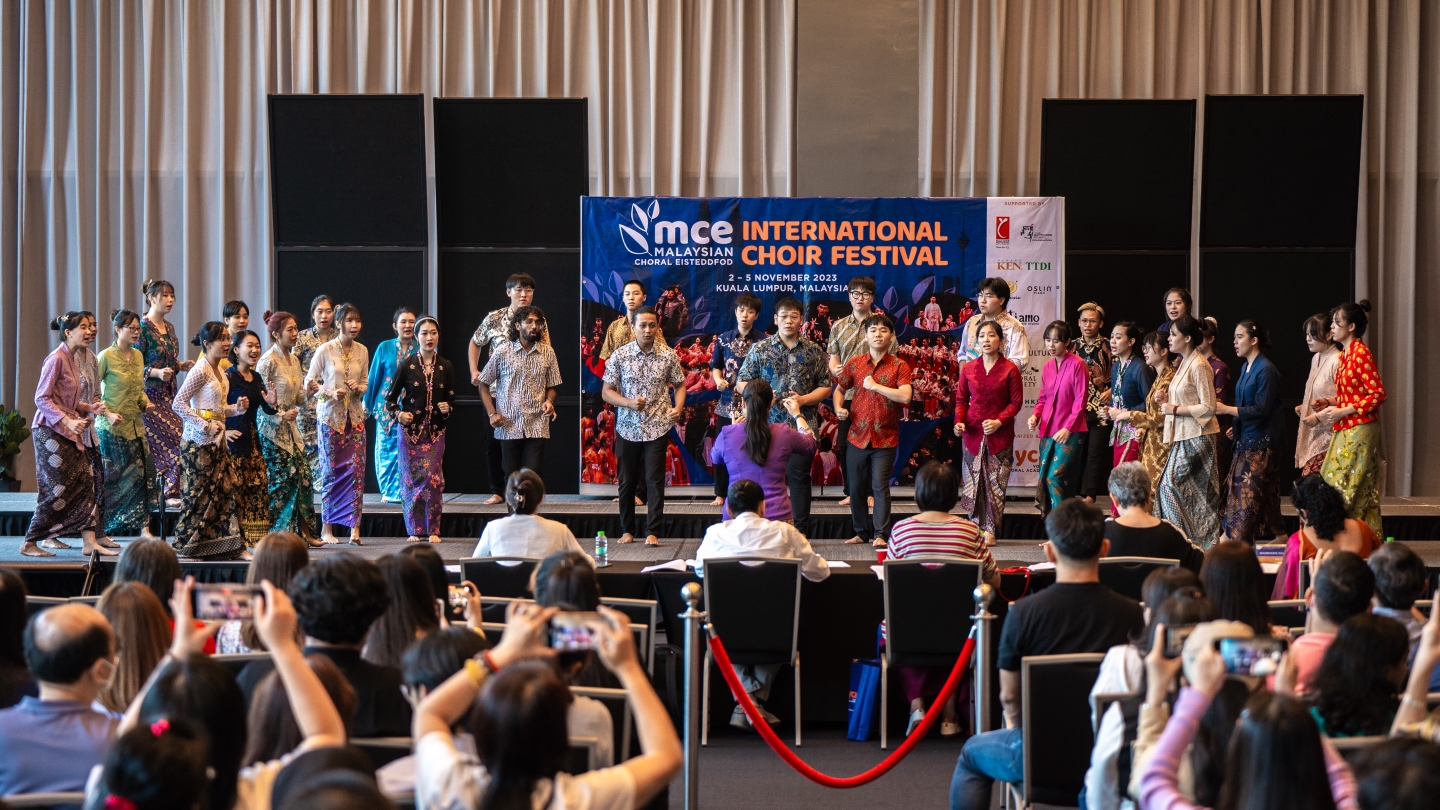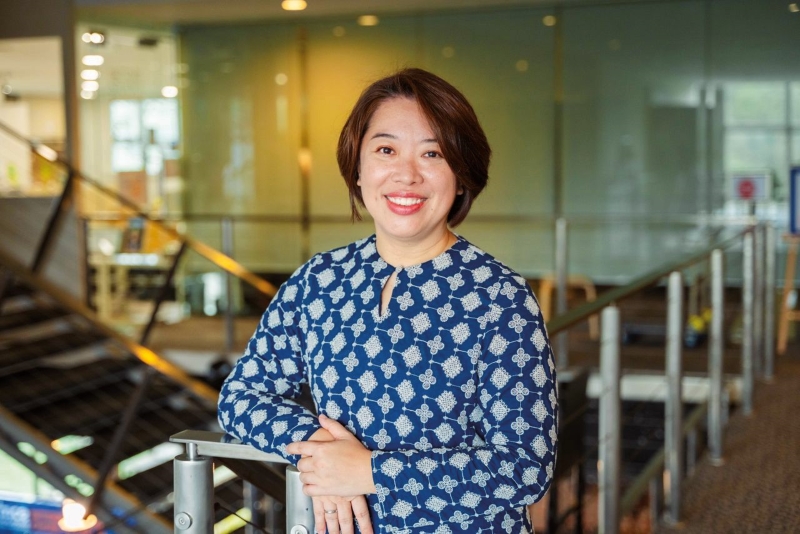
The USM SOTA Chamber Choir from Penang (All photos: Malaysian Choral Eisteddfod)
The obvious thing about choral singing is an ensemble joined by song and different voices blending in unison. What audiences may not see is the importance of every part, however minor, among those on the stage.
Music educator Susanna Saw says choirs are an avenue to make music together with like-minded people who love to sing, try new songs, learn from each other about rehearsal culture, and widen their knowledge of choral repertoire.
“When you sing alone, you showcase your own vocal abilities. It’s different in a choir. When singing your own part, you have to listen to the other parts as well. It’s multitasking.
“To perform together, you also need to understand how others work. Some may read notes very fast while others need a longer time. You have to be patient and persevere,” says Saw. Ultimately, “when many voices come together and send out the same message in a concert, it can be a very strong tool.
“And you don’t sing only for competitions” — the reason that prompted Saw and fellow musician Mak Chi Hoe to start the Malaysian Choral Eisteddfod (MCE) in 2002. Welsh for “sitting together”, eisteddfod originated in the traditions of court bards and every August, participants gather at a national event in Wales to celebrate music, poetry and literature.
“When I first returned from Australia to teach Malaysian school choirs, I realised the students were only looking forward to the yearly interschool camps. That became very competitive as they viewed each other as rivals. So we set up MCE, an international choir festival, and invite guest conductors to come and teach new songs,” explains Saw, its organiser and artistic director.
susanna_saw.jpg

What began as a one-day affair at a secondary school in Ipoh 22 years ago has blossomed into a major event that will involve 164 choirs and more than 5,000 participants from Nov 6 to 10. This year’s fest opens with the 3rd Asia Choral Grand Prix, hosted by MCE, in Kuala Lumpur. Following that, groups from Indonesia, the Philippines, Taiwan and Singapore will join those in the country over the five days.
Concurrent rounds of competitions and activities will be held at three venues in KL — Dewan Filharmonik Petronas, klpac and Menara KEN TTDI. There will be workshops for teachers and the public, as well as concerts open to all.
A joint production of the musical We Are One is on the MCE programme. It will feature the children’s choirs of Voice of Bali (from Indonesia), Soul Sound Academy (Sri Lanka) and the KL Children’s Choir, formed by Saw in 2003 to introduce kids to choral singing.
She has been teaching choir, a subject under performance ensemble at Universiti Malaya’s Music Department, since 2006, and is also director and founder of the Young Choral Academy (YCA), the first such set-up in the country in 2007.
“Malaysian choirs have evolved and are progressing very well. That’s why we are fighting very hard to make people aware of the importance of music education through singing in a group.”
Saw is happy to see school choirs coming up. “They are full on and their level is good. Some even raise funds to travel overseas to take part in competitions.
msian_choral_eisteddfod_international_choir_festival_2023_pic_b.jpg

“We also have more and more younger musicians going abroad to study choral conducting. Some are back and starting to teach here. We’re moving towards the right path. That’s why I feel it is time to make Malaysian choirs known.”
This is a leap from when she started working with school groups, which sang mainly pop songs and musical theatre arrangements.
At MCE, Wu Lingfen, a professor from the China Conservatory of Music, will share different kinds of Chinese choral works and show teachers how to choose suitable repertoires for students. They can learn to arrange pop music for choirs because the young love such songs and should not be forced to just focus on classical numbers.
Clinicians will conduct sessions on singing techniques because conductors need to understand the vocal mechanism and how to bring out the best sounds from a singer, Saw says.
“As long as you can speak, you can sing,” she emphasises. “There is no such term as ‘tone deaf’ in the music dictionary. If someone cannot match pitch, perhaps it’s because they don’t know how to use their instrument, which is the voice, or their body, and what they need to listen to. So singers need to be trained.”
Shyness holds Malaysians back from using song to express themselves, she observes. “In Indonesia and the Philippines, everywhere people go, they sing. They walk out to the streets and break into song.
“But here, when you ask someone if they can sing, they say, ‘No, no, no. I’ve got no voice, no energy.’ We have many excuses for being afraid to sing.”
msian_choral_eisteddfod_international_choir_festival_2023_pic_a.jpg

Which is a shame because “the voice is such an immediate tool. It’s our most natural instrument. That’s why we’ve been working very hard to encourage people to sing”.
Saw always reminds her students she does not expect them to be superstars. “But at least be a good team player when you work together. You can identify your different emotions and learn how to face them. Because, if you are nervous when going up on stage, how are you going to deliver the songs?”
Sometimes, we only focus on the academic aspect in school, she reckons. “When children do music, they learn about science (the vocal mechanism), maths through rhythms, language and culture. Music-making covers all the subjects taught in school.”
We Are One, composed and directed by Indonesia’s Frederich Henoch Samalang, is a case in point. “It unites voices from across borders”, audiences who caught the show in Bali said.
One soloist each from the three countries in the 45-minute show come on stage and start to introduce their homeland. They teach each other songs and dances, and talk about the importance of making friends and knowing each other’s lifestyle and food.
Saw’s YCA Chorus, the adult section of her academy, will likely do the same at the 1st International Choral Festival (Oct 3 and 4) hosted by the National Chorus of Korea. They have been invited to perform at this event in Seoul.
“We will be singing a repertoire of Malaysian songs and doing folk dances. We are promoting the country through choir.”
For details on the Malaysian Choral Eisteddfod, call (019) 236 2066 or email mce.malaysia@youngchoral.com.
This article first appeared on Sept 30, 2024 in The Edge Malaysia.


